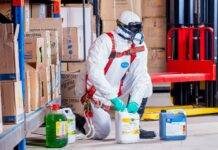
Why COSHH is Essential for Workplace Safety
Why COSHH is Essential for Workplace Safety : Chemicals play a significant role in various industries, from cleaning products to manufacturing materials. While they are indispensable, they also pose inherent risks to health and safety. This is where COSHH (Control of Substances Hazardous to Health) regulations step in, serving as a crucial framework for protecting individuals from potential harm caused by hazardous substances.
Introduction to COSHH
COSHH stands as a pivotal safeguard within workplaces, ensuring the control and management of substances that could be detrimental to health. It encompasses a wide array of substances, including chemicals, fumes, dust, and biological agents.
Understanding COSHH Regulations
Comprehending the regulations is vital across diverse sectors. They not only outline guidelines but also emphasize the responsibilities of employers and employees regarding hazardous substances. These regulations vary depending on the nature of the substances and the specific risks associated.
Importance of COSHH in Various Industries
Different industries face distinct chemical hazards. For instance, healthcare settings deal with biological agents, while manufacturing sectors handle various chemicals. Understanding COSHH within these contexts helps tailor safety measures accordingly.
Health Risks Associated with Hazardous Substances
Chemical Exposure in the Workplace
Employees constantly exposed to hazardous substances risk various health conditions. These could range from skin irritation and respiratory issues to severe long-term effects, such as organ damage or cancer.
Potential Health Issues
Understanding the correlation between exposure and health implications is crucial. COSHH compliance aims to mitigate these risks by implementing preventive measures and controls.
Benefits of COSHH Compliance
Ensuring Employee Safety
Prioritizing COSHH compliance directly correlates with creating a safe working environment. This not only safeguards the physical well-being of employees but also fosters a culture of trust and security within the organization.
Legal and Financial Implications
Non-compliance with COSHH regulations can result in severe legal consequences and financial setbacks for businesses. Adhering to these regulations not only prevents penalties but also saves costs related to potential accidents or health issues.
Implementing COSHH Regulations
Risk Assessment Procedures
Conducting thorough risk assessments identifies potential hazards and enables the establishment of effective controls to minimize risks.
Control Measures and Training
Implementing control measures and providing comprehensive training equips employees with the necessary knowledge to handle hazardous substances safely.
Importance of Training and Awareness
Educating Employees on COSHH
Empowering employees through education ensures their active involvement in maintaining a safe work environment.
Promoting a Safety Culture
A robust safety culture fosters a proactive approach towards COSHH compliance, encouraging continuous improvement in safety standards.
Monitoring and Reviewing COSHH Measures
Regular Evaluation and Updates
Continuous monitoring and periodic reviews are essential to adapt to changing workplace conditions and new substances.
Conclusion
COSHH regulations stand as an imperative framework for safeguarding the well-being of individuals exposed to hazardous substances in the workplace. Compliance not only ensures safety but also contributes to organizational resilience and sustainability.
COSHH (Control of Substances Hazardous to Health)
Chemical Safety Toolbox Talk Meeting
Chemical Safety Basic Knowledge
Unique FAQs
- What are the penalties for non-compliance with COSHH regulations? Non-compliance can lead to severe penalties, including fines and potential legal action. It’s crucial for businesses to adhere to these regulations to avoid such consequences.
- How often should risk assessments be conducted under COSHH regulations? Risk assessments should be conducted regularly and whenever there are significant changes in workplace conditions or substances handled.
- Why is employee training vital in COSHH compliance? Employee training ensures that individuals understand the risks associated with hazardous substances and know how to handle them safely, minimizing potential harm.
- Can COSHH regulations vary between industries? Yes, COSHH regulations are tailored to specific industries and the nature of substances they handle. Different sectors may have unique guidelines to address their specific risks.
- What role does monitoring play in COSHH compliance? Monitoring ensures that control measures remain effective and relevant, allowing for adjustments to be made promptly to uphold safety standards.
























